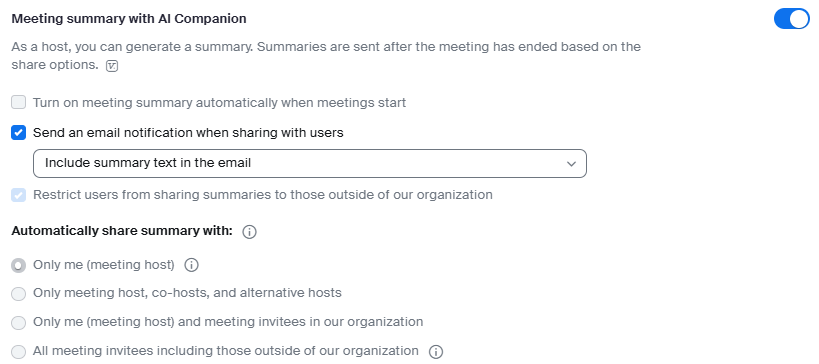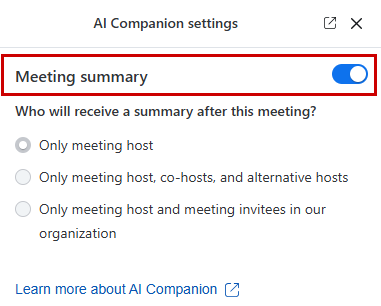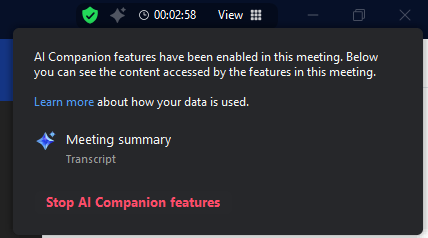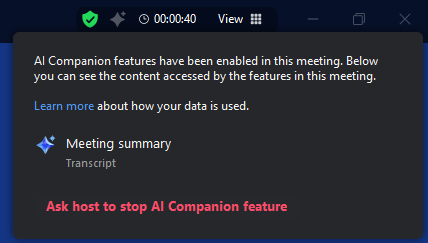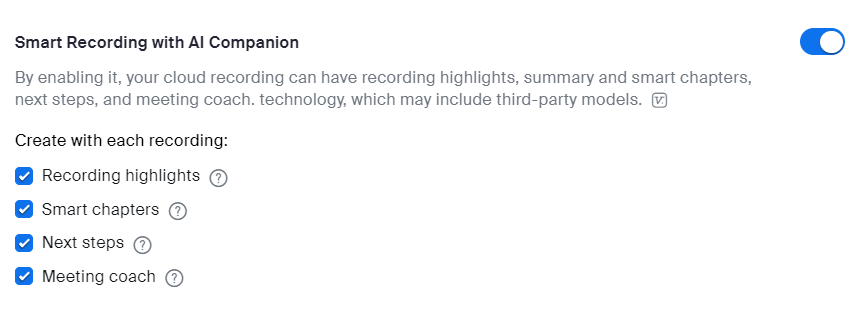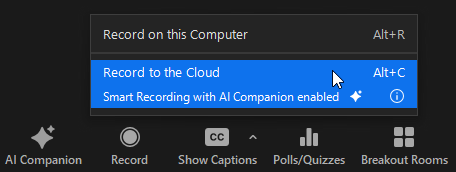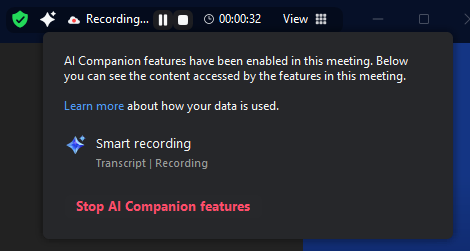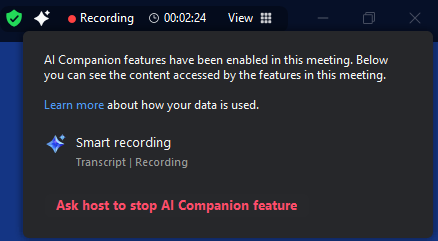- Privacy, Security, FERPA, and HIPAA Guidelines
- What is AI Companion?
- Meeting Summary with AI Companion
- Smart Recording with AI Companion
- Accessibility
- FAQ
Privacy, Security, FERPA, and HIPAA Guidelines
When utilizing any of the features included with the Zoom Toolset, please note the following restrictions and requirements:
Restrictions
- Do not record or store any sensitive Personal Identifiable Information (PII) or Protected Health Information (PHI), such as social security numbers (SSNs), student education records, dates of birth, medical records, or personal contact information. This includes PII or PHI related to research participants.
- Consider the nature of your meeting. When deciding whether to utilize the Zoom Toolset features, bear in mind that any recordings or summaries generated using these tools may be discoverable in the event of any dispute or litigation to which JHU or JHHS is a party. In light of this, use caution in deciding whether to use the Zoom Toolset features (i.e. recording, Smart Recording, or Meeting Summary) in meetings where particularly sensitive, privileged, or confidential data or information may be discussed. Do not use the Zoom Toolset in any clinical, telemedicine, or healthcare settings (e.g., during any patient encounters), peer review meetings, IRB meetings, Animal Care and Use Committee (ACUC) meetings, or meetings that are entered into public records.
- Be cognizant of the audience which meeting summaries and smart recordings are shared with.
Requirements
- If you enable any of the Zoom Toolset features, it is your responsibility to review all recordings and summaries generated by Zoom for accuracy and completeness, and to correct any obvious errors or inaccuracies.
- If the Zoom Toolset will be used in any research setting (including as an administrative tool), notify the IRB and ensure that all IRB and other applicable requirements are met.
- Please familiarize yourself with the current Johns Hopkins Sensitive Data policies and Guidelines for Recording Class Meetings.
- Review Zoom’s support article on how Zoom AI Companion features handle your data.
What is AI Companion?
As more fully described herein, Zoom’s AI Companion is an AI-based digital assistant that delivers real-time capabilities, functionality, and assistance to help users improve their productivity and their user-experience when using Zoom. AI Companion can:
- Deliver smart recordings that break down the recording into chapters, while highlighting important information and next steps.
- Create meeting summaries detailing noteworthy topics and discussion points.
Meeting Summary with AI Companion
The Meeting Summary feature within the Zoom AI toolset generates a high-level summary of the meeting. This summary includes notable discussion topics and highlights mentioned during the meeting without the need to manually take meeting notes. Once the meeting has concluded, the summary becomes available to the host within their Zoom web portal, which can be further shared if necessary. Zoom Meeting summaries will be deleted from the Zoom web portal after 180 days.
Enabling Meeting Summary
To enable Meeting Summary for use within your meetings:
- Login to Zoom at the web, jh.zoom.us.
- Navigate to Settings > AI Companion.
- From here, enable Meeting Summary with AI Companion by clicking the toggle next to the feature to mark it in blue. To disable the feature, click the toggle again until it is marked in gray.
- The following settings are disabled and locked:
- Turn on meeting summary automatically when meetings start
- Restrict users from sharing summaries to those outside of our organization
- Automatically share summary with: Only me (meeting host)
- Hosts have the ability to enable or disable the following setting:
- Send an email notification when sharing with users
Using Meeting Summary
Once the Meeting Summary feature has been enabled at the web, meeting hosts/co-host(s) can start the summary within the meeting, by clicking AI Companion button in their Zoom meeting controls:
To stop Meeting Summary, meeting hosts/co-host(s) will need to click the toggle next to Meeting summary:
Once Meeting Summary has been started, the meeting host/co-host(s) and participants will receive the following notification and prompts (below) from Zoom, making them aware that the meeting summary feature is enabled. Additionally, any participants that join the meeting late will also be notified that meeting summary is active.
Once the meeting has ended, the meeting summary will be generated and finalized. Once available, meeting hosts can locate the summary within their Zoom account, under the My Summaries tab, with the options to share, edit, and delete the summary. The summary will also be emailed directly to the host. The meeting host is responsible for reviewing their summary for accuracy and completeness, and for correcting obvious errors or inaccuracies in the summary before it is shared to a broader audience or otherwise saved for future use.
For more information, refer to Zoom’s support guide for Using Meeting Summary with AI Companion.
Smart Recording with AI Companion
The Smart Recording feature within the Zoom AI Companion toolset not only generates cloud recordings with transcripts, but also:
- Breaks the recording down into sections with timestamps, known as Smart Chapters.
- Identifies action items mentioned during the meeting or webinar, denoting these items as Next Steps.
- Recognizes and singles out the most important parts of the meeting or webinar as Recording Highlights.
- Provides analytics on meeting and conversation metrics, such as talking speed, talk-to-listen ratios, and more, through Meeting Coach.
Enabling Smart Recording
To enable the Smart Recording for use within your meetings:
- Login to Zoom at the web, jh.zoom.us.
- Navigate to Settings > AI Companion.
- From here, enable Smart Recording with AI Companion by clicking the toggle next to the feature to mark it in blue. To disable the feature, click the toggle again until it is marked in gray.
- Once Smart Recording has been enabled, additional settings will display that can be toggled on or off, including:
- Recording highlights
- Smart chapters
- Next steps
- Meeting coach
Using Smart Recording
Once the Smart Recording feature has been enabled at the web, meeting hosts/co-hosts will continue to create, start/stop, and pause Zoom cloud recordings as they have previously. The Smart Chapters, Next Steps, Recording Highlights, and Meeting Coach will be available when viewing the cloud recording at the web. To start a cloud recording, click Record > Record to the Cloud.
After clicking Record to the Cloud, the meeting host/co-host(s) and participants will receive the following notification prompts (below) from Zoom, making them aware that the meeting is being recorded to the Zoom Cloud. Additionally, any participants that join the meeting late will also be notified that the meeting is actively being recorded.
Once the meeting has ended and the cloud recording has processed, the host will receive an email with a link to the cloud recording in Zoom. From here, the host can review the AI-generated Smart Chapters, Next Steps, Recording Highlights, and meeting analytics created by Meeting Coach. As with all meeting recordings, the Smart Recording will be deleted from the Zoom web portal after 180 days. The meeting host is responsible for reviewing the recording and its corresponding transcript for accuracy and completeness, and for correcting any obvious errors or inaccuracies in the transcript, before it is shared to a broader audience or otherwise saved for future use.
For more information, refer to Zoom’s support guide for Using Smart Recording with AI Companion.
Accessibility
Please Review Zoom’s support page on accessibility for more information.
FAQ
Q: Is AI Companion free of charge?
A: Yes, AI Companion is included, at no additional charge, for all Licensed Zoom accounts in the Johns Hopkins enterprise. AI Companion is not supported for Basic or free accounts.
Q: What Zoom AI Companion features are available for use?
A: Meeting Summary and Smart Recording are the only AI Companion features currently approved for use at Johns Hopkins.
Q: What are the retention policies for AI Companion-generated summaries and recordings?
A:
- Meeting summaries will be automatically deleted after 180 days.
- Smart Recordings will be deleted after 180 days, which follows the Johns Hopkins retention policy for regular Zoom Cloud Recordings.
Q: May I use a similar note-taking or smart-meeting AI tool for my meetings? (E.g. Fireflies.ai, Read.ai, etc.)
A: No. Due to security, legal, and compliance concerns, Zoom AI Companion is currently the only approved AI add-on toolset.
Q: How do I prevent Read.ai and Otter.ai bots from automatically joining my Zoom meetings?
A: Johns Hopkins is taking the steps to block all third-party AI transcription services from joining meetings hosted within the enterprise. In the interim, users with preexisting Otter.ai or Read.ai accounts should take the steps to delete their accounts. Please visit and review the linked articles below:
- Read.ai: How do I remove or stop Read from joining meetings?
- Read.ai: What meetings does Read join when I connect my calendar?
- Read.ai: Delete your account
- Otter.ai: Stop Otter.ai from automatically joining your meetings
- Otter.ai: Manage your calendar meeting events
- Otter.ai: Delete your account
Q: What AI Companion features are HIPAA-compliant?
A: Currently, Meeting Summary and Smart Recording for meetings are HIPAA-complaint. Please note that if your Zoom account is part of a HIPAA-compliant subaccount (JHJHM or JHSON), these are the only AI companion features available to you at this time. See Privacy, Security, FERPA, and HIPAA Guidelines above for further information.
Q: What are the FERPA considerations of using Zoom AI Companion?
A: At JHU, student education records are considered Personally Identifiable Information (PII). As such, meeting hosts should not enable any of the AI Companion features for meetings involving student education record data. Please see Privacy, Security, FERPA, and HIPAA Guidelines above for further information.
Q: Can I use Zoom AI Companion features in my classroom?
A: Please consult JHU’s Guidelines for Recording Class Meetings for procedures regarding FERPA compliance when recording class sessions. Additionally, please note that JHU considers student education records to be Personally Identifiable Information (PII). As such, meeting hosts should not enable any of the AI Companion features for meetings involving student education record data. Please see Privacy, Security, FERPA, and HIPAA Guidelines above for further information.
Q: Does Zoom use my recording and transcript data to train AI?
A: Zoom does not use any of your audio, video, chat, screen sharing, attachments or other communications-like customer content (such as poll results, whiteboard and reactions) to train Zoom’s or its third-party artificial intelligence models.
Q: Is Zoom AI Companion available to student Zoom accounts?
A: Yes – Meeting Summary and Smart Recording are available for Zoom accounts within the student/JHU Blue Jays instance (https://jhubluejays.zoom.us/).
Please Note: Smart Recording is only available for students who have Cloud Recording enabled for their Zoom account, which is not the default for all students. More information can be found on the Guide to Cloud Recording for Students.

